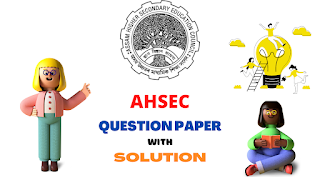AHSEC| CLASS 11| HISTORY| SOLVED PAPER - 2016| H.S.1ST YEAR
2016
HISTORY
Full Marks: 100
Time: 3 hours
The figures in the margin indicate full marks for the questions
1. Answer the following questions / Choose the correct answer: 1x12=12
a) When was the first human-like creatures appeared on the earth surface?
Ans:- Apes-like creatures appeared about
400 million years ago. But modern humans appeared only about 100,000 years ago.
b) Who were Hadza?
Ans:- The Hadza, or Hadzabe, are an
indigenous ethnic group in north-central Tanzania, who live in the central Rift
Valley and around Lake Isai in the neighboring Serengeti Plateau. The Hadza
number is just under 1,000. About 300-400 Hadza live as hunter-gatherers, as
much as their ancestors have for tens of thousands of years. They are among the
last predators in the world.
c) What is the name of Islamic calendar?
Ans:- Hijri.
d) What was the language of the sacred books of ancient Iran?
Ans:- Avesta.
e) Name the sailor who discovered India.
Ans:- Vasco-da-Gama.
f) From which word the term ‘Feudalism’ was derived?
Ans:- Latin
Word ‘feodum’.
g) Who wrote The Civilization of the Renaissance in Italy?
Ans:- Jacob Burckhardt.
h) Who led the Protestant Movement against the Catholics in Europe?
Ans:- Martin Luther’s.
i) When was the ‘Bank of England’ established?
Ans:- July 27, 1694.
j) In which year the British arrived in Australia?
Ans:- 1788.
k) What was the original name of Tokyo city?
Ans:- Edo.
l) The close associate of Mao Tse-tung was
(i) Dr. Sun Yat-sen.
(ii) Chiang Kai-shek.
(iii) Yuan Shih-kai.
(iv) Chou En-lai.
Ans:- (ii) Chiang Kai-shek.
2. Answer the following questions in brief: 2x12=24
a) What is Ethnography?
Ans:- Ethnography is the systematic
study of people and cultures. It is designed to explore cultural phenomena
where the researcher views society from the point of view of the subject of
study. An ethnography is a means of presenting a group's culture graphically
and in writing. Thus, the term can be said to have a "double
meaning", depending partly on whether it is used as a counting noun or
uncountable. The resulting field study or case report shows the system of knowledge
and meaning in the life of a cultural group.
b) What were the food products in Mesopotamia?
Ans:- Onion, Beet, Turnip, Pearl,
Barley, Date etc.
c) Where and in which year the Christianity originated first?
Ans:- 33CE Palestine.
d) Name two powerful empires of Europe in the seventh century.
Ans:- Portuguese Empire & Spain Empire.
e) What was Shahnama?
Ans:- The Shahnama, also transliterated
as Shahnama, is a long epic poem by the Persian poet Firdausi written between
c. 977 and 1010 CE and is the national epic of Greater Iran. Consisting of
around 60,000 verses, Shahnamesh is the longest epic poem in the world written
by a single poet. It mainly tells the mythological and to a lesser extent the
historical past of the Persian Empire, from the creation of the world to the
Islamic conquest of Persia in the 7th century. Today Iran, Azerbaijan,
Afghanistan and large regions influenced by Persian culture (such as Georgia,
Armenia, Turkey and Dagestan) celebrate this national epic.
f) Why was the Great Wall of China constructed?
Ans: The Great Wall of China is one of
the seven wonders of the world. It was constructed before the 8th century for
security reasons. At one time the Mongols and other Central Asian nomads had
trade links with China. It was mutually beneficial for both the parties.
Commerce during that time was not without its tensions, with sometimes groups
of merchants applying military pressure to increase profits. There were
frequent disputes between the two sides regarding this. China was suffering
from widespread nomadic infiltration. Therefore, the Chinese ruler-built forts
to protect his subjects. Those fortifications began to be integrated into a
common defensive outwork. Today it is known as the Great Wall of China.
g) What were the three orders in the society of medieval Europe?
Ans:- Those Who Work, Those Who Fight,
Those Who Pray.
h) Describe two features of early feudal society in France.
Ans:- (a) Lords rules over the farmers
who work for him.
(b) A priest/church who has a strong influence over an area or even
the entire state.
i) Write the name of any two new food items which were transmitted from
South America to the rest of the world.
Ans:- Citrus fruits and the melon are
the new food items.
j) In which cities of Japan, America dropped nuclear bombs?
Ans:- Hiroshima and Nagasaki.
k) Give two reasons which preferred the industrialists to employ women
and children in their factories.
Ans:- (a) Women were paid cheaper wages
than men.
(b) Children had small hands, so if there was a problem with the
machinery, they could easily fix it.
l) What were the three important messages of Sun Yat-sen?
Ans:- Nationalism, democracy and
livelihood of the people.
[COMING SOON]
HISTORY SOLVED PAPERS PAGE LINK - Click here
BUY E-BOOK (PDF FILE)
[TO SEE FULL SOLUTION]
(Chapter wise Notes, Exam Question Papers solved, MCQ solved) [ARTS, COMMERCE, SCIENCE]
|
DOWNLOAD PAGE LINK:-CLICK HERE |
AHSEC PAGE LINK - CLICK HERE
Also Read:

